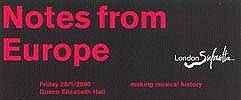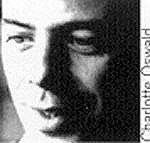
We have to thank Thomas Ades for introducing us to two fascinating European composers, in a three-part concert with long intervals for platform re-arrangements and some of his own shorter pieces in the middle. It was not easy to get on with Helmut Oehring's Polaroids for counter tenor (Andrew Watts - singing in German) and deaf actress (Christina Schonfeld, communicating mostly in gesture and with German sign-language). Oehring's parents are both deaf, so as a child he learned sign language first.
The appeal of Polaroids must remain very limited, and performances few, with the hurdle to be confronted of the unusual modes of communication, largely ineffectual, between the principal performers themselves and with ourselves - this apparently the chief object of the exercise. Another obstacle was that the planned pre-concert conversation with the creators of Polaroids and a sign language interpreter never took place, one of a spate of concert casualties to seasonal ills, which have been sweeping UK and Europe. It must be said that the audience reception was warm and many present were moved by this unique experience.
The protagonists of Polaroids were supported by an amplified instrumental ensemble. This tended to sound as if coming mainly from the block of loud speakers at one or other side of the platform, even from the central block of the stalls, another inhibiting factor which can go against natural communication between musicians and listeners. This is a constant difficulty confronting electro-acoustic performances in concert; the ideal centre of the stereo triangle is restricted and most ticket holders do not get the intended sound picture.
Hanspeter Kyburz's Cells (1993/94, UK premiere) was quite another matter. This as yet little known Swiss composer (b. 1960) teaches in Berlin and Darmstadt but has not featured conspicuously on the UK contemporary music circuit. There was a freshness and invigorating complexity in the multiplicity of ideas and swirling sounds which enveloped us for most of half an hour. Its originality was immediately evident and it held attention throughout. Roland Kluttig, based mainly in Berlin and Stuttgart, brought Cells vividly to life and the soloist, Simon Haram, was impressive in the realisation of his part in so complex a score and deploying saxophones of all sizes in the midst of the maelstrom.Peter Grahame Woolf
S&H's latest recruit to its team of reviewers, Jean Martin*, has kindly provided fuller background about Kyburz & Cells:-
Hanspeter Kyburz is very much interested in the idea that small causes lead to unpredictable results, unpredictable because too many variables are involved, e.g. the famous stroke of a butterfly which eventually causes a storm on the other side of the globe.
Kyburz uses a computer to develop and test compositional scenarios. After he has made an aesthetic or musical decision - the computer algorithms mere tools - he transcribes the results into conventional notation for traditional instruments.
Kyburz has said: "I use the computer in a dialogical way. I translate my musical imagination into instructions for the computer and then listen to the result. Thus I can
experience whether the result can match my imagination. Sometimes I am disappointed to find that I could only grasp rationally a very small part of the requirements, the instructions for the computer are too reduced and the result doesn't live upto my expectations. On the other hand I get surprised by the computer, because unexpected consequences in complex processes can stimulate my imagination again. It is a dialogue: I can correct myself, and I love to be surprised by the computer."
In listening to this complex and surprising piece one can sense the intellectual vigour applied in the composition process, even though there is far too much to grasp on first hearing. There seem to be similarities with the way that Magnus Lindberg, now well established and regularly played in UK, also works. It is regrettable that this important UK was not chosen for recording and broadcast on R3; its success should encourage further exploration here of Hanspeter Kyburz's oeuvre.
Much hyped since his prize-winning success across the ocean, Thomas Ades presented some of his early compositions, which he conducted himself: Catch (1991), Life Story (1993) and The Origin of the Harp (1994). It was interesting to hear them next to the two continental composers from Berlin. Ades' gestures were much more conventional. The music sounded nice and well crafted but, following Cells, they didn't leave a deep impression.
Jean Martin
The three Ades works are brilliantly played and recorded in 1997-98 by EMI Classics on two recommendable, inexpensive Ades CDs; [EMI Classics "Debut" series 7243 5 72271 2 4 and 7243 5 69699 2 6], PGW.
(Jean Martin* established an electronic music studio in Berlin, and his extremely varied career has encompassed working as sound engineer, teaching flute, composing and teaching film music, making radio programmes about British contemporary music for German radio, and music for TV documentaries.)

 Return to:
Return to: